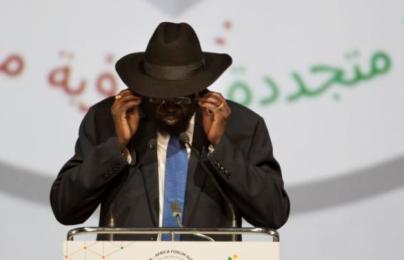JMEC calls on President Kiir not to form government without Machar
February 18, 2016 (NAIROBI) – South Sudanese President, Salva Kiir, should not form a Transitional Government of National Unity (TGoNU) without the participation of all the parties to the August 2015 peace agreement, said the Joint Monitoring and Evaluation Commission (JMEC) – the highest body that oversees the implementation of the peace deal.

In the statement, the group of senior officials representing their governments and international bodies said forming a new government without all the parties, including the main armed opposition faction of the Sudan People’s Liberation Movement (SPLM-IO) led by the newly appointed First Vice President, Riek Machar, would undermine the peace deal.
“In this regard, it is essential that all parties to the agreement participate in formation of the government; proceeding unilaterally would undermine the letter and spirit of the peace agreement,” partly reads the statement extended to Sudan Tribune on Thursday.
JMEC also said Juba should be demilitarized first and forces of the SPLA-IO transported to Juba before the government can be formed.
“Forming the transitional government requires progress on agreed security arrangements for Juba, the cantonment of SPLA troops at least 25km outside Juba, and the return of SPLM-IO security forces,” it said.
“We urge that these commitments be carried out expeditiously.”
JMEC also said it is deeply troubled by ongoing reports of ceasefire violations, such as those detailed in the January 2016 JMEC report, as well as the catastrophic humanitarian situation.
It called on all parties to honour their commitment to a permanent ceasefire and to granting unfettered access for members of the Ceasefire Transitional Security Arrangement Monitoring Mechanism (CTSAMM) monitors and humanitarian assistance.
The body said it fully supported President Festus Mogae – chairman of JMEC – in his work, his mandate, the integrity of JMEC, and the decisions taken so far in furtherance of the peace agreement.
“The JMEC Partners Group will remain in close contact with our representatives in Juba, and will together remain vigilant in supporting JMEC and the South Sudanese parties to ensure all elements of the agreement are implemented in good faith,” it added.
The group said it will convene again in April in Addis Ababa to further support South Sudan and ARCSS implementation, and may also convene on an ad hoc basis as necessary.
It called on the parties to expedite the implementation of the security arrangements in Juba so that they form the transitional government.
However, JMEC officials in Juba on Thursday said it will take at least one month to complete the implementation of the security arrangements, including demilitarization of Juba and arrival of 2,910 opposition forces so that a transitional government can be formed.
“It will take several weeks to provide resource for the movement; mostly of the opposition forces back to Juba. So the timeline, if we don’t have any more setbacks, then we could see the movement of those forces complete within four to six weeks,” said Bill Harmon, JMEC security and military advisor.
He blamed the delay on lack of resources and the time it will take to mobilize them and establish camps and transport the opposition troops to Juba.
(ST)
